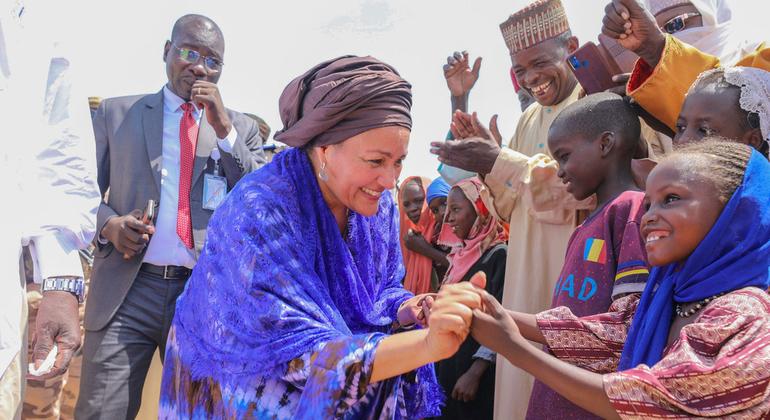The United Nations Sustainable Development Goals (SDGs) are a set of 17 global goals aimed at achieving a better and more sustainable future for all. With the 2030 deadline fast approaching, the global community is coming together at the High-Level Political Forum (HLPF) to discuss ways to accelerate progress towards these goals and ensure that no country is left behind.
One of the key events taking place on the sidelines of the HLPF is the Special Event entitled “Keeping the SDG Promise: Pathways for Acceleration.” This event is aimed at giving a boost to the so-called “High Impact Initiatives” championed by the entire UN development system, as well as highlighting key investment strategies and countries that are leading the way in achieving the SDGs.
In an exclusive interview with UN News, Deputy Secretary-General Amina Mohammed emphasized six key transition areas that are essential for accelerating progress towards the SDGs. These areas include food systems, energy access and affordability, digital connectivity, education, jobs and social protection, and climate change, biodiversity loss, and pollution.
When asked about her message to world leaders at the HLPF, Amina Mohammed urged them to be true leaders for the people, the planet, and the promises made in the SDG agenda. She emphasized the importance of accountability to the UN Charter and encouraged leaders to listen to the voices and expectations of those most affected by the SDGs.
The United Nations system has united around these six key transitions or pathways to acceleration in response to the wake-up call from Member States about the urgent need to get back on track with the SDGs. Amina Mohammed highlighted the importance of these pathways in mobilizing resources and investments to deliver on all 17 SDGs.
The first key transition area mentioned by Amina Mohammed is food systems. The impact of COVID-19 on global food systems has been significant, leading to disruptions and challenges in ensuring food security for all. The UN has responded to these challenges through initiatives like the Black Sea Grain Initiative, but there is still more work to be done to strengthen food systems and ensure access to nutritious and sustainable food for all.
Energy access and affordability are also crucial areas for accelerating progress towards the SDGs. Access to clean and affordable energy is essential for sustainable development and combating climate change. The UN is working to mobilize resources and investments to expand access to renewable energy sources and promote energy efficiency in order to achieve universal energy access for all.
Digital connectivity is another key transition area highlighted by Amina Mohammed. In an increasingly digital world, access to information and communication technologies is essential for economic growth, education, and social inclusion. The UN is working to bridge the digital divide and ensure that everyone has access to the benefits of digital technology.
Education is a fundamental human right and a key driver of sustainable development. Quality education can empower individuals, lift people out of poverty, and promote gender equality. The UN is working to ensure that all children have access to quality education and lifelong learning opportunities, regardless of their background or circumstances.
Jobs and social protection are also essential components of sustainable development. Decent work and social protection systems can help lift people out of poverty, reduce inequality, and promote inclusive economic growth. The UN is working to create job opportunities, support small businesses, and strengthen social protection systems to ensure that everyone has access to the resources they need to thrive.
Finally, climate change, biodiversity loss, and pollution are urgent global challenges that require immediate action. The UN is working to mobilize resources and investments to combat climate change, protect biodiversity, and reduce pollution in order to create a more sustainable and resilient future for all.
In conclusion, the SDGs are a shared vision for a better and more sustainable world, and it is crucial that world leaders come together to accelerate progress towards these goals and ensure that no one is left behind. By focusing on these key transition areas and mobilizing resources and investments, the UN is working to create a more equitable, sustainable, and prosperous future for all.









